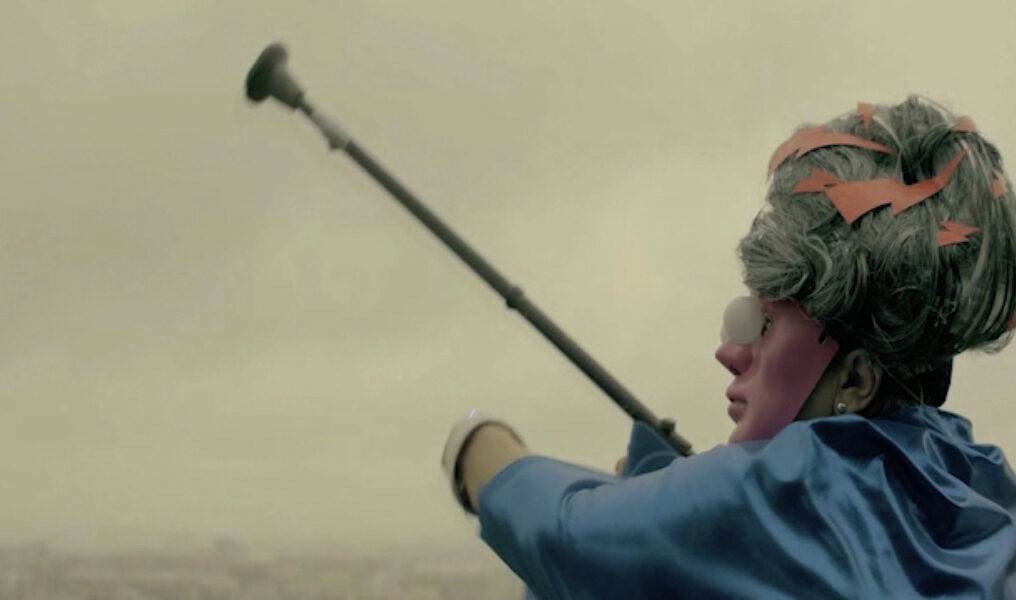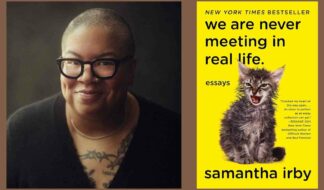A Michigan mainstay for nearly 60 years, the Ann Arbor Film Festival is billed as the oldest avant-garde experimental film festival in North America, receiving thousands of submissions from over 70 countries around the globe. And for roughly a third of the time the festival has existed, it's had its own LGBTQ-specific Out Night, too. Leslie Raymond is the executive director of AAFF and said that the night is a significant one in the festival's history because it aligns with the overall goal of the event.
"I think one of the things the film festival does is make a space for voices that are not as heard," Raymond said. "I think whether that's the LGBTQ community or black voices or women's voices, we want to make sure we're a platform to that. I would say in addition, because we're outside the mainstream, outside of commercial film festivals, even just making space and showing artist's films is in the same spirit of providing a platform for everyone's voices. [Rather] than that one sort of mainstream more homogenized voice we're used to seeing when see television."
And beyond just sharing those voices, AAFF provides cash and in-kind prizes to filmmakers who screen their work at the festival. One of AAFF's 22 awards is the aut FILM Award for Best LGBTQ Film worth $300, awarded to the filmmakers who address LGBTQ issues and gives voice to members of that community. The award is named after the former owners of Ann Arbor's aut Bar, Martin Contreras and Keith Orr, who just this year sold the space after decades of cultivating it as an iconic LGBTQ destination in the Ann Arbor area which it remains to this day.
In advance of the festival, BTL caught up with Sean Donovan, a doctoral student in the College of Literature, Science, and the Arts at the University of Michigan, who is a guest programmer for Out Night this year to get a feel for what viewers can expect from the seven chosen LGBTQ films this year and to learn more about the LGBTQ-specific evening.
This year's Out Night themes are memory, community and historical belonging. Why did AAFF choose to focus on those topics?
Out Night is an event that the Ann Arbor Film Festival holds annually as part of the experimental film festival and that theme really just emerged from the submitted filmmakers' work. It's really what we saw recurring in a lot of the submissions we got. So, I think that theme came organically from the filmmakers themselves. But it is interesting to think about 2019 as this moment that has inspired this very reflective, historically poignant, sort of aesthetic consideration in queer experimental filmmaking.
You've mentioned before that Out Night being a part of a non-LGBTQ-specific festival is a great opportunity, could you talk more about that?
In the past, I've worked as a programmer for LGBTQ-specific film festivals. This is my first time on the programming end for a non-queer-specific film festival. But through the few encounters I've had with people who are loyal to the Ann Arbor Film Festival and come every year, it seems like they're down for pretty much anything and will be there Thursday at Out Night just like they go to the rest of the screened material. So, I think it is a really great opportunity to highlight the platform for queer experimental art that is not strictly within the big banner of an LGBTQ film festival, and I'm really excited about that.
Why is it important that specifically experimental LGBTQ films get shown?
I think one of the great things about experimental film festivals, in general, is that it is both filmmakers and audiences responding to an overall environment of media consumption that is maybe not exactly what they want. There is not as much pushing of the boundaries, testing of the limits, experimentation with form; that's why artists keep coming back to the Ann Arbor Film Festival. They like to see those boundaries tested in a way they're not in an average movie theater. But, what gets forgotten is that LGBTQ audiences and consumers feel that same anxiety and I think it comes with more political stakes in the lives of queer viewers.
I identify as a queer man and when I was growing up I was often frustrated that when I saw gay characters on television when I saw queer experiences in the movies, I didn't feel like the representation neatly mapped onto me or my experience. And the effect of that pretty colossal; if you feel like you are not being represented on screen, it leaves you feeling a bit unmoored or unsure of your identity or of what you see as a workable, thriving, happy life. And the point of experimental filmmaking is not really to give you a representation that you feel is concretely you, but one that speaks to some part of your soul and some part of the queer experience in a more abstract way. I think that's what a lot of these folks do, they sort of color outside the lines and work outside of the boundaries of what we think of as traditional LGBTQ representation and try to find something more experimental and new. I think that's a valuable thing.
There's often a noticeable difference between content made for LGBTQ people by those not in that community and LGBTQ-made media.
I think part of is, the sort of mainstream Hollywood fix of [the LGBTQ representation] problem is to give us a lot of positive representation, happy gay characters, happy lesbian characters, but sometimes those kinds of characters and representation can feel a bit flat if you've actually gone through the pain, the nuance, all of the emotional intensity that being a queer person comes with. I think some of these films dig into some of that pain and finding unique and artistic ways to represent.
What are some of the highlights you're looking forward to sharing with the audience this year? Are there any films that stood out to you, or you feel that will stand out to viewers?
One thing that I think is great about the Out Night programming that we have this year is that we have not only the traditional short film compendium that screens at 7:15 on Thursday, the 28th, but we also have after that feature film called "Wonders Wander" which was submitted by a Spanish activist collective and is really just a utopian sci-fi queer extravaganza that is very fun and that's not often what you expect from that kind of content. You hear queer experimental filmmaking and you sometimes think it's very serious, very brooding, sometimes sad, and I think it's great that this year we have the short films which do strike a quieter, kind of more reflective tone and then this feature film that is much more celebratory and loud and is all about really paying tribute to the beautiful aspects of queer life. I think it's great that we have both of those things. We have a lot of trans content this year, too. That was an important thing for me with programming this particular version of Out Night to highlight trans filmmakers and trans voices.
To see the full list of films at this year's Out Night and all of AAFF, visit aafilmfest.org.











